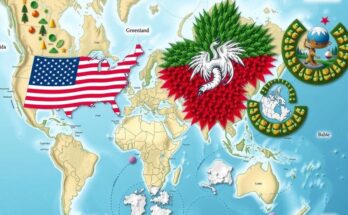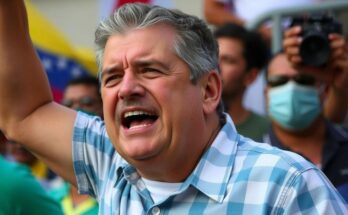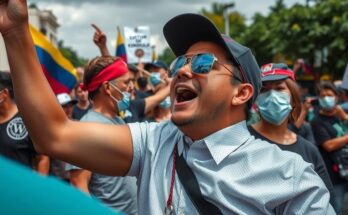Mozambique’s presidential election is occurring amidst pressing national challenges, with around 17 million voters registered. The ruling Frelimo party’s David Chapo, alongside contenders Venacio Mondlane and others, seeks to address issues such as jihadist insurgency and severe food shortages. Past electoral fraud has raised concerns, but expectations for a more stable process are noted. The election’s outcome will significantly influence Mozambique’s governance and efforts to resolve ongoing crises.
On a crucial election day in Mozambique, citizens are poised to participate in a historic presidential election aimed at selecting a successor to President Filipe Nyusi, who has completed two terms in office. Approximately 17 million voters out of the nation’s 31 million are registered to cast their ballots not only for the presidency but also for 250 parliamentary positions as well as provincial assembly members. The ruling party, the Front for the Liberation of Mozambique (Frelimo), is anticipated to maintain its grip on power despite growing competition from at least four opposition candidates, all of whom have been actively campaigning to usher in change. The country currently grapples with a protracted jihadist insurgency in its northern region and is highly susceptible to extreme climate-related phenomena, such as flooding. Since the onset of the insurgency, more than 1.3 million individuals have been displaced, while widespread drought has precipitated severe food shortages for countless others. Notably, a previous local election in Mozambique was marked by serious allegations of electoral fraud, resulting in violent protests, although tensions appear to have lessened leading into this election. The Frelimo party has nominated David Chapo, a former governor of Inhambane – a key area for Mozambique’s tourism sector – as its presidential candidate. Chapo, at 47 years of age, aims to leverage his regional governance experience. Facing him is 50-year-old Venacio Mondlane, an independent candidate and banking expert, who has gathered considerable support under the campaign banner “Save Mozambique, this country’s ours.” Mondlane, who alleges that he was robbed of victory in a previous mayoral election, has attracted supporters from the newly formed Optimistic Party for the Development of Mozambique (Podemos). Other significant candidates include Lutero Simango from the Democratic Movement of Mozambique, appealing particularly to the youth with policies addressing inequality and employability, and Ossufo Momade, the leader of the Mozambique National Resistance (Renamo), who continues to carry the legacy of the late Afonso Dhlakama. Moreover, Mozambique remains engulfed in violence linked to an Islamic State-affiliated group that has perpetrated heinous acts in Cabo Delgado since 2017. In a recent report, the United Nations revealed that approximately 600,000 of the displaced individuals have returned to their ravaged communities, which lack essential infrastructure and services. Candidates have pledged to tackle critical developmental challenges stemming from the insurgency, including the stalling of a vital gas project under French company TotalEnergies, contributing to rising unemployment and hunger exacerbated by climactic pressures like El Niño. The World Food Program has indicated that 1.3 million people are currently experiencing severe food shortages. Frelimo’s reputation has been marred by corruption controversies, notably the “tuna bond” scandal, resulting in a significant financial crisis for the country and loss of international monetary support after discovering $2 billion in concealed debt. This election day will culminate in immediate counting and an initial dissemination of partial results, with official outcomes being published by the National Election Commission after 15 days, followed by validation from the Constitutional Council. Any party dissatisfied with the election results has the right to challenge them before the council, which will adjudicate upon the merits of these claims.
The upcoming presidential election in Mozambique represents a pivotal moment for the nation, as it seeks to choose a successor to President Filipe Nyusi. The political landscape is characterized by the longstanding dominance of the Frelimo party since independence in 1975, coupled with mounting challenges from various opposition candidates driven to foster change amidst significant national issues like insurgency and climate vulnerability. This election is also shaping up against the backdrop of a troubled history of electoral fraud, recent humanitarian crises due to conflict and natural disasters, and corruption scandals that have plagued the ruling party, making this election particularly significant for the future trajectory of Mozambique’s governance and socio-economic stability.
In conclusion, the presidential election in Mozambique is set to be a defining event for the nation, with an unprecedented number of registered voters ready to influence the future leadership. With key candidates like David Chapo from the ruling Frelimo party and independent contender Venacio Mondlane, the election promises a contest that could reshape Mozambique’s socio-political landscape. As the country grapples with pressing issues of insurgency, environmental calamities, unemployment, and corruption, the outcomes of this election will be crucial in determining how these challenges are addressed moving forward. The international community will undoubtedly be closely monitoring the electoral process to ensure a transparent and fair election.
Original Source: abcnews.go.com




